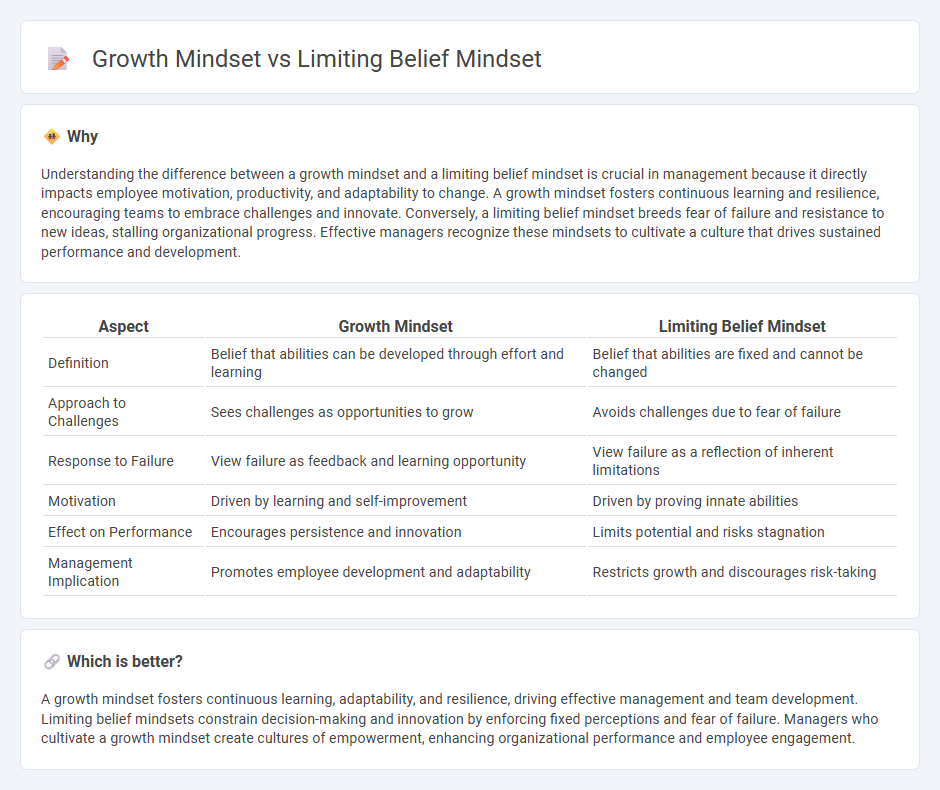
Growth mindset fosters resilience and continuous learning by embracing challenges and viewing failures as opportunities for development, driving effective management and innovation. Limiting belief mindset restricts potential by promoting fear of failure and resistance to change, hindering leadership effectiveness and team performance. Explore strategies to cultivate a growth mindset and overcome limiting beliefs in management for sustained organizational success.
Why it is important
Understanding the difference between a growth mindset and a limiting belief mindset is crucial in management because it directly impacts employee motivation, productivity, and adaptability to change. A growth mindset fosters continuous learning and resilience, encouraging teams to embrace challenges and innovate. Conversely, a limiting belief mindset breeds fear of failure and resistance to new ideas, stalling organizational progress. Effective managers recognize these mindsets to cultivate a culture that drives sustained performance and development.
Comparison Table
| Aspect | Growth Mindset | Limiting Belief Mindset |
|---|---|---|
| Definition | Belief that abilities can be developed through effort and learning | Belief that abilities are fixed and cannot be changed |
| Approach to Challenges | Sees challenges as opportunities to grow | Avoids challenges due to fear of failure |
| Response to Failure | View failure as feedback and learning opportunity | View failure as a reflection of inherent limitations |
| Motivation | Driven by learning and self-improvement | Driven by proving innate abilities |
| Effect on Performance | Encourages persistence and innovation | Limits potential and risks stagnation |
| Management Implication | Promotes employee development and adaptability | Restricts growth and discourages risk-taking |
Which is better?
A growth mindset fosters continuous learning, adaptability, and resilience, driving effective management and team development. Limiting belief mindsets constrain decision-making and innovation by enforcing fixed perceptions and fear of failure. Managers who cultivate a growth mindset create cultures of empowerment, enhancing organizational performance and employee engagement.
Connection
A growth mindset fosters resilience and continuous learning by embracing challenges and perceiving failures as opportunities, while a limiting belief mindset restricts potential through self-imposed doubts and fear of failure. In management, shifting from limiting beliefs to a growth mindset enhances decision-making, innovation, and team motivation. Understanding this connection enables leaders to cultivate a culture that drives organizational growth and adaptability.
Key Terms
Fixed Mindset
A fixed mindset believes abilities and intelligence are static traits that cannot be changed, leading to avoidance of challenges and fear of failure. This limiting belief mindset hinders personal development and restricts potential by fostering resistance to learning opportunities. Explore strategies to shift from a fixed mindset to embrace growth and unlock continuous self-improvement.
Self-Efficacy
Limiting belief mindsets hinder self-efficacy by fostering doubts and reducing confidence in one's abilities to achieve goals, leading to stagnant personal growth. Growth mindsets enhance self-efficacy by embracing challenges, learning from failures, and reinforcing the belief that effort improves competence over time. Explore deeper strategies to transform limiting beliefs into a growth mindset for empowered self-efficacy.
Continuous Improvement
A limiting belief mindset restricts personal and professional development by fostering self-doubt, fear of failure, and resistance to change, which hinders continuous improvement. In contrast, a growth mindset embraces challenges, learns from feedback, and persistently seeks opportunities for skill enhancement and innovation. Explore how shifting to a growth mindset can unlock your potential for ongoing progress and success.
Source and External Links
Breaking Through Limiting Beliefs - This article discusses how limiting beliefs can hinder personal growth by restricting potential and opportunities, often originating from personal experiences and upbringing.
10 Limiting Beliefs and How to Overcome Them - This resource identifies common limiting beliefs and provides strategies for overcoming them, highlighting their impact on self-esteem and work performance.
What Are Limiting Beliefs - This article explains the nature of limiting beliefs, how they originate from family values and life experiences, and their role in hindering personal and professional development.
 dowidth.com
dowidth.com